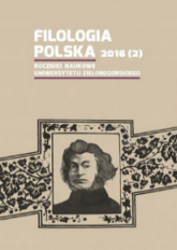The riddle of Escape
Keywords
Abstract
This sketch has failed to solve the puzzle of Escape [Ucieczka]. Three basic interrelated questions about the time and place of the work’s origin and its message effectively defend themselves against a clear and convincing answer. One cannot exclude the probability of any of the presented hypotheses as to the time and place of the work’s origin. What was Mickiewicz’s purpose while writing and publishing this ballad still remains the mystery the poet took to his grave. The attempts to categorize Escape as an experiment (as Kleiner wants) or a poetry workshop exercise (Maria Żmigrodzka) are rather a testimony of surrender to the text, which – referring indirectly to Bürger’s original – is nothing but a Polish version of Lenora, like Świetlana by Żukowski is its Russian version. However, being taken out of the volume Ballady i romanse of 1822 it gives the impression of an oddly isolated work.
References
LITERATURA CYTOWANA
Althof L. Ch., Einige Nachrichten von den vornehmsten Lebensumständen Gottfried August Bürgers nebst einem Beitrage zur Charakteristik desselben, Göttingen 1798.
[Google Scholar]
Borowy W., O poezji Mickiewicza, t. I, Lublin 1958 [Google Scholar]
Borowy W., Ucieczka, [w:] idem: O poezji Mickiewicza, wydanie drugie uzupełnione, Lublin 1999.
[Google Scholar]
Bürger G. A., Lenore, [cyt. za:] idem, Gedichte. Ausgabe 1789, Hamburg b. d.
[Google Scholar]
„Dziennik Wileński” 1822, t. II, nr 6.
[Google Scholar]
Gamska-Łempicka J., Lenoara [przekład], [w:] Niemiecka ballada romantyczna, oprac. Z. Ciechanowska, Wrocław 1963, BN II, nr 142.
[Google Scholar]
Gloger Z., Encyklopedia staropolska, t. IV, Warszawa 1904.
[Google Scholar]
Gołębiowski Ł., Lud polski, jego zwyczaje i zabobony, Warszawa 1830.
[Google Scholar]
Kaim-Kloock L., Gottfried August Bürger. Zum Problem der Volkstümlichkeit in der Lyrik, Berlin 1963.
[Google Scholar]
Klaczko J., „Ucieczka” i „Lenora”, [w:] idem, Zapomniane pisma polskie (1850-1866), Kraków 1912.
[Google Scholar]
Kleiner J., Mickiewicz, t. I, cz. 2. Dzieje Konrada, Lublin 1948.
[Google Scholar]
Kośny W., Die polnischen Übersetzungen von G. A. Bürgers „Lenore” vor dem Erscheinen der Ballade „Ucieczka” von Adam Mickiewicz, [w:] Między Oświeceniem i Romantyzmem. Kultura polska około 1800 roku, red., J. Z. Lichański, Warszawa 1997.
[Google Scholar]
Kośny W., Nochmals zu Bürgers „Lenore” und Mickiewiczs „Ucieczka”, [w:] Slavische Literaturen im Dialog. Festschrift für Reinhardt Lauer zum 65. Geburtstag, Hrsg. U. Jekutsch und W. Kroll, Wiesbaden 2000.
[Google Scholar]
Krzyżanowski J., Polska bajka ludowa w układzie systematycznym, t. II: Baśń magiczna, Warszawa 1947.
[Google Scholar]
Lenora. Ballada z Bürgera, [w:] Poezje, t. I, Wilno 1825.
[Google Scholar]
Libera L., „Don Carlos” w tłumaczeniu Mickiewicza, „Rocznik Towarzystwa Literackiego im. Adama Mickiewicza” 1996, R. XXXI.
[Google Scholar]
Libera L., Mickiewicz als Übersetzer des Schillerschen „Handschuhs”, [w:] „Zeitschrift für slavische Philologie”, Heidelberg 1987, Band XLVII – Heft 2.
[Google Scholar]
Libera L., Rękawiczka, [w:] Mickiewicz, Zielona Góra 2015.
[Google Scholar]
Maciejewski J., Mickiewicza wielkopolskie drogi. Rekonstrukcje i refleksje, Poznań 1972.
[Google Scholar]
Mickiewicz A., Dzieła wszystkie, t. I, cz. 3, Wiersze 1829-1855, Warszawa 1981.
[Google Scholar]
Mickiewicz A., Dzieła, t. I: Wiersze, Wydanie Narodowe, Warszawa 1949.
[Google Scholar]
Mickiewicz A., Dzieła, t. V, Pisma prozą, cz. I, Wydanie Narodowe.
[Google Scholar]
Mickiewicz A., Dzieła, t. XIX, Listy, cz. 1, Wydanie Narodowe, Warszawa 1953.
[Google Scholar]
Niemiecka ballada romantyczna, oprac. Z. Ciechanowska, BN II, nr 142, Wrocław 1963.
[Google Scholar]
Odyniec A. E., Listy z podróży, t. I, oprac. M. Toporowski, wstęp M. Dernałowicz, Warszawa 1961.
[Google Scholar]
Odyniec A. E., Tłómaczenia, t. II, Warszawa 1874, s. 195.
[Google Scholar]
Poezje Adama Mickiewicza, pięć tomów w jednym, z portretem autora, Poznań 1832.
[Google Scholar]
Scherer H., Lange schon in manchem Sturm und Drange. Gottfried August Bürger, der Dichter des Münchhausen. Eine Biographie, Berlin 1995.
[Google Scholar]
[Schiller F.], Über Bürgers Gedichte, „Allgemeine Literatur-Zeitung” 1791 (15 i 17 stycznia).
[Google Scholar]
Schöne A., Lenore, [w:] Die deutsche Lyrik. Form und Geschichte. Interpretationen, Band. I: Vom Mittelalter bis zur Frühromantik, Hrsg. B. von Wiese, Düsseldorf 1964.
[Google Scholar]
Trzeciakowski W., Lenora, „Przegląd Artystyczno-Literacki” 2000, 5 (99).
[Google Scholar]
Wagner H. F., Das Eindringen von Percy’s Reliques in Deutschland, Heidelberg 1897.
[Google Scholar]
Zgorzelski C., O sztuce poetyckiej Mickiewicza. Próby zbliżeń i uogólnień, Warszawa 1976.
[Google Scholar]
Zur Erklärung und Beurtheilung von Bürgers Lenore, [w:] „Altdeutsche Blätter“, Band I, Leipzig 1836.
[Google Scholar]
Żmigrodzka M., Podstawowe cechy Mickiewiczowskiej ballady, [w:] Materiały dyskusyjne Komisji Naukowej Obchodu Roku Mickiewiczowskiego, Warszawa 1955.
[Google Scholar]
Preview
Downloads
Published
How to Cite
Issue
Section
Categories
Copyright & License

This work is licensed under a Creative Commons Attribution-NonCommercial-NoDerivatives 4.0 International License.
Copyrights (a). In principle, authors who are not employed by the University of Zielona Góra retain the copyright, including publishing rights to the articles, without restrictions.
Copyrights (b). In principle, authors who are employed by the University of Zielona Góra, do not retain the copyright, including publishing rights to the articles. In such cases the copyright holder is the University of Zielona Góra.
Print ISSN
2450-3584-
Abstract114











































